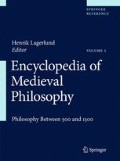Abstract
Walter Chatton (c. 1290–1343) was an important fourteenth-century English philosopher and theologian. He was a follower of Duns Scotus and a relentless critic of William of Ockham and Peter Auriol. Because complete critical editions of Chatton’s writings have only recently become available, the recovery of his thought is in the beginning stages. Still, it is already clear that Chatton made significant contributions to number of areas in medieval philosophy and theology. These include his development and defense of an “anti-razor” principle in ontology, his contributions to fourteenth-century debates about intuitive cognition, his one-level account of consciousness, and his influential criticisms of Ockham’s theory of concepts and judgment.
Bibliography
Primary Sources
Chatton Walter (1989) Reportatio et lectura super Sententias: Collatio ad librum primum et prologus, ed. Wey JC. Pontifical Institute of Mediaeval Studies, Toronto
Chatton Walter (2002–2005) Reportatio super Sententias, ed. Wey JC, Etzkorn G. Pontifical Institute of Mediaeval Studies, Toronto
Chatton Walter (2007–) Lectura super Sententias, ed. Wey JC, Etzkorn G. Pontifical Institute of Mediaeval Studies, Toronto
Secondary Sources
Brower-Toland S (2006) Facts vs. things: Adam Wodeham and the later medieval debate about objects of judgment. Rev Metaphys 60:597–642
Brower-Toland S (2007) Ockham on judgment, concepts, and the problem of intentionality. Can J Philos 37:67–110
Brower-Toland S (forthcoming) Can God know more? A case study in the later medieval debate about propositions. In: Keele R, Bolyard C (eds) Essays in later medieval metaphysics. Fordham University Press, Bronx
Brower-Toland S (forthcoming) William Ockham and Walter Chatton on objects and acts of judgment: or, How Chatton changed Ockham’s mind. In: Klima G (ed) Intentionality, cognition, and mental representation in medieval philosophy. Fordham University Press, Bronx
Brown S (1985) Walter Chatton’s Lectura and William of Ockham’s Quaestiones in libros Physicorum Aristotelis. In: Frank WA, Etzkorn GJ (eds) Essays honoring Allan B. Wolter. Franciscan Institute, St. Bonaventure, pp 82–115
Courtenay W (1990) Ockham, Chatton, and the London studium: observation on recent changes to Ockham’s biography. In: Vossenkuhl W, Schönberger R (eds) Gegenwart Ockhams. VCH-Verlagsgesellschaft, Acta Humaniora, Weinheim, pp 327–337
Gál G (1967) Gualteri de Chatton et Guillelmi de Ockham controversia de natura conceptus universalis. Francisc Stud 27:191–212
Hoffmann T (2008) Walter Chatton on the connection of the virtues. Quaestio: Yearbook of the history of metaphysics 8:57–82
Keele R (2003) The so-called Res theory of Walter Chatton. Francisc Stud 61:37–53
Keele R (2006) Walter Chatton. In: Zalta EN (ed) The Stanford encyclopedia of philosophy (Fall 2006 edition), http://plato.stanford.edu/archives/ fall2006/entries/walter-chatton/
Keele R (2007a) Can God make a Picasso? William Ockham and Walter Chatton on divine power and real relations. J Hist Philos 45:395–411
Keele R (2007b) Oxford Quodlibeta from Ockham to Holcot. In: Schabel C (ed) Theological quodlibeta in the Middle Ages, the fourteenth century. Brill, Leiden-Boston, pp 651–692
Kelley F (1981) Walter Chatton vs. Aureoli and Ockham regarding the universal concept. Franciscan Stud 41:222–249
Maurer A (1984) Ockham’s razor and Chatton’s anti-razor. Mediaev Stud 46:463–475
O’Callaghan J (1949) Walter Chatton’s doctrine of intuitive and abstractive knowledge: study and text. PhD dissertation, University of Toronto
Tachau K (1988) Vision and certitude in the age of Ockham: optics, epistemology and the foundations of semantics 1250–1345. Brill, Leiden
Yrjönsuuri M (2007) The structure of consciousness: a fourteenth-century debate. In: Heinämaa S, Lähteenmäki V, Remes P (eds) Consciousness: from perception to reflection in the history of philosophy. Springer, Dordrecht, pp 141–152
Author information
Authors and Affiliations
Editor information
Editors and Affiliations
Rights and permissions
Copyright information
© 2011 Springer Science+Business Media B.V.
About this entry
Cite this entry
Brower-Toland, S. (2011). Walter Chatton. In: Lagerlund, H. (eds) Encyclopedia of Medieval Philosophy. Springer, Dordrecht. https://doi.org/10.1007/978-1-4020-9729-4_520
Download citation
DOI: https://doi.org/10.1007/978-1-4020-9729-4_520
Publisher Name: Springer, Dordrecht
Print ISBN: 978-1-4020-9728-7
Online ISBN: 978-1-4020-9729-4
eBook Packages: Humanities, Social Sciences and Law

